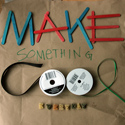I recently received a copy of Bending Toward the Sun which is written by Leslie Gilbert-Lurie with her mother Rita Lurie. The book is a memoir that shows how true events of the Holocaust altered the lives not only of those who survived, but their children and even grandchildren.
From the official site,
"Rita Lurie was five years old when she was forced to flee her home in Poland to hide from the Nazis. From the summer of 1942 to mid-1944, she and fourteen members of her family shared a nearly silent existence in a cramped, dark attic, subsisting on scraps of raw food. Young Rita watched helplessly as first her younger brother then her mother died before her eyes. Motherless and stateless, Rita and her surviving family spent the next five years wandering throughout Europe, waiting for a country to accept them. The tragedy of the Holocaust was only the beginning of Rita's story."
My husband is the grandson of German Jews who made it safety to American shores from Nazi Germany, so this book particularly resonated with me. Even though my entire family was safely in the U.S. by the time the War began, I am a daughter and I have daughters, so it spoke to me on that level as well.
This book is utterly fascinating. It's unlike any other book on the Shoa I have ever read. The jacket describes it quite well,
"A decade-long collaboration between mother and daughter, Bending Toward the Sun reveals how deeply the Holocaust remains in the hearts and minds of survivors, influencing even the lives of their descendants. It also sheds light on the generational reach of any trauma, beyond the initial victim."
I was astounded to find that this book begins where most books on the topic end. We find the Gamss family leaving their hiding place on page 53, the beginning of only the fifth chapter. The rest of the book focuses first on Ruchel/Rita Lurie's story in her own voice and then her daughter Leslie takes over. There's even a portion written (fascinatingly well) by Leslie's 12-year-old daughter Mikeala (I laughed out loud when she referred to Adolf Hitler as a "Power-hungry man with unfortunate facial hair"). I think this was a fantastic way to work this complex story. We get to really see the complexity of the trauma as it weaves its way through the different generations.
This was one of those books that I picked up and didn't want to put down. I was up until midnight last night because I found myself so hungry for more of the story. What happened next? I had to know. Even when I forced myself to put it down, I couldn't sleep because I kept wondering what more I would learn about Ruchel as she traveled around Europe and then headed to America where she began her transformation to Rita.
I picked it up again today and didn't put it down again until I had read it cover-to-cover. I became completely absorbed with the entire family in the beginning and never lost that interest or concern for them. The account left me wondering what would become of each aunt, uncle and cousin and the book answered my questions (in addition the official website has a fledgling "Where Are They Now" section which appears as though it will feature profiles of family members when it's completed). It was fascinating to first read Rita Lurie's account of growing up with her family and then to see those same family members and even their children through Leslie Gilbert-Lurie's account.
Leslie opens the book with an account which illustrates that her daughter, Mikeala, like her mother before her, has inherited that overwhelming intense fear of abandoment which is understandable, but debilitating at the same time.
I was struck not only by the fear which the Gamss family endured, but also by the normalcy they later created. Rita Lurie married at an early age and, by all accounts, she and her husband are still together and happy 50 years later. Her sister, Sara/Sandra was married 43 years before she lost her husband to Cancer. One of the great uncles Leslie interviewed was still married to the woman he married in Italy just after the war. They were able to find love. They were able to bring children into a world even though they had witnessed the absolute worst. They were cautious. They were weary. They were worn down, yet they were all survivors.
I just visited the website for this review and I'm impressed by all they have available there which compliments the book. I'm thrilled to find a resource section which includes a link for teachers. The additional family photos are fascinating. You can watch videos of Leslie discussing the book as well.
Rabbi Irving Greenberg calls this memoir, "heartbreaking, yet inspiring." I agree completely.
Subscribe to:
Post Comments (Atom)












1 comment:
lovely review. i haven't started it yet, but i also got a copy. can't wait to read it!
i recommend anita diamant's new book - it was great too.
Post a Comment